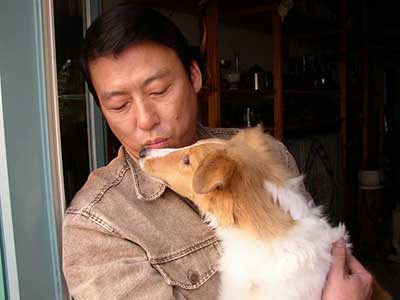Small dogs get run of China; big ones face pound
By Michael A. Lev
Tribune foreign correspondent
Chicago Tribune
Published December 1, 2003
BEIJING -- Din-Din is in hiding. Kan-Kan has been sprung.
Such are the destinies of dogs in Beijing, where the government has never seemed entirely comfortable with the concept of canines as pets.
Under regulations that take effect Monday, small breeds, like Kan-Kan, a Pekinese, have been granted full legitimacy and can be walked on the streets any time of day. Medium-sized and large dogs like Din-Din have been targeted for a crackdown.
Police will patrol streets and have the authority to enter private residences and confiscate any dog that stands taller than about 14 inches because of an official view of larger dogs as a nuisance. They will be impounded, along with any other unregistered dogs, in government dog pounds that animal-rights activists describe as unfit.
The unspoken worry among dog lovers is that impounded pets will be destroyed because there is room in shelters only for about 500 animals in a city with as many as 1 million dogs, tens of thousands of which are now illegal because they exceed the height limit.
Chinese authorities have a reputation for dealing ruthlessly with dogs, which have been beaten to death by police during past roundups.
Din-Din, a Dalmation kept in the courtyard of an apartment by a Beijing doctor named Gao, is stashed away in the kitchen of Gao's son-in-law's office in a downtown building until the family can figure out how to protect him.
In a high-rise condominium owned by Xu Zhang, a growing collie puppy named Jason spends his days sequestered on the balcony with Nao-Nao the pug. Jason is days away from violating the height requirement, while the pug is contraband because he is the second dog owned by Xu and the rules permit only one dog per household.
"I'm worried," Xu said. "There's so much affection involved. I don't understand how they decided to ban dogs based on size. It lacks scientific evidence. When they drafted the rules, they should have consulted experts. You don't ban dogs by size. You do it by temperament."
China's non-democratic government, which enforces a far more intrusive lifestyle ban--the one-child policy--does not need to react to public criticism. When it comes to dogs, the government takes the position that only small dogs are appropriate for a crowded city where most people are apartment dwellers.
Pets have been unwelcome
Its views are shaped by a lack of tradition. Past generations in the cities never saw dogs because residents could not afford pets and the Communist Party viewed the concept as a disagreeable bourgeois pursuit.
As a result, many Chinese city dwellers with little canine experience are deathly afraid of bigger dogs and do not, for example, recognize that different breeds can have different personalities. To the uninitiated, a gentle Labrador retriever looks as vicious as a Doberman.
Chinese authorities also worry about rabies. Rabies cases leaped nearly 63 percent in the first nine months of the year and killed 1,297 people due to stray dogs, a lack of awareness, poor vaccination quality and the burgeoning pet ownership trend, said the China Daily newspaper.
In one county in the southern province of Guangxi, 19 people died of rabies, leading the local government to announce plans to kill 200,000 "illegal" dogs.
As pet dogs began to appear in the past decade, the government imposed expensive licensing fees and allowed dogs outside only from 8 p.m. to 7 a.m. Big dogs were prohibited, but as the pets became more popular, large-breed fanciers began to ignore the ban.
There are no official estimates, but there may be 1 million pet dogs in Beijing, including perhaps more than 30,000 over 14 inches.
 Free to walk any time
Free to walk any time
Under the rules, small dogs, for the first time, may be walked any time of day. Registration fees have been reduced from more than $600 to $125, with a 50 percent reduction for animals that are neutered. Dogs also must be vaccinated. Unregistered dogs will be confiscated.
"These are good changes because before I had to get up very early," said Duang Zheng Guo, 58, as he took an afternoon stroll with Kan-Kan, a fluffy white Pekinese wearing a pink dog coat.
Zhang Li, the China director for the U.S.-based International Fund for Animal Welfare, said his group worked with the Chinese government on the new rules but had not been notified about the plan to round up bigger dogs. He said he hoped to persuade officials to reconsider the ban, at least for residents with larger living spaces.
He said that despite some assurances that conditions have been improved in city pounds, he was worried because in the past dogs kept in shelters were underfed and crowded together in unsanitary surroundings. Disease was rampant, he said, and most animals died.
But just as troubling was the emotional damage done to the owners of confiscated pets.
"Dogs are like members of the family," he said. "Imagine if you took away a child, what would happen to the family."


